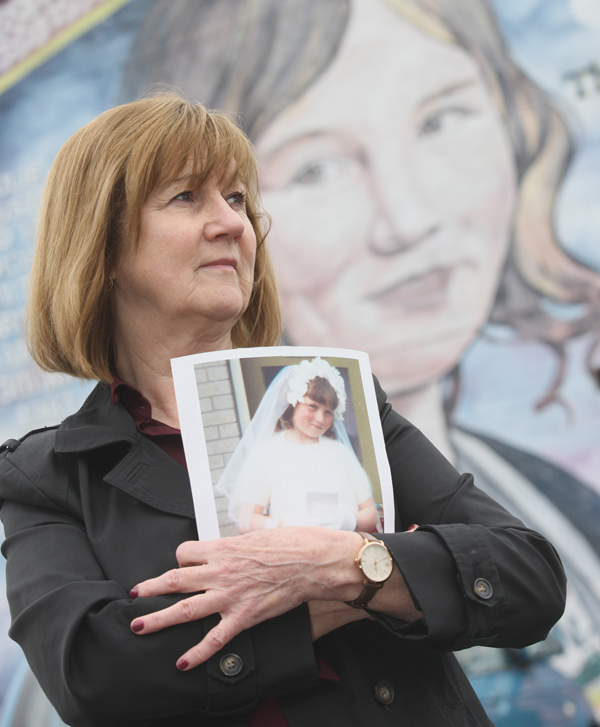THE sister of a 14-year-old Lenadoon girl killed by a plastic bullet in 1981 has hit out a decision to lock the National Archives file on her death for another 45 years.
Julie Livingstone was returning from a local shop on the Stewartstown Road when she was fatally injured by a plastic bullet on 12, May 1981. The round, which was fired from a British Army vehicle, struck her on the head and she died the next day.
Earlier this week, researchers at the Pat Finucane Centre in Derry revealed that files held at the National Archives in Kew, London, relating to Julie’s death are to be kept closed until 2064.
Earlier this week it was reported that a further file relating to the plastic bullet death of a child has been locked for decades. 15-year-old Paul Whitters, who died on April 25, 1981, 10 days after being struck in the head with a plastic bullet fired by the RUC in Derry, has been closed until 2059.
It is extremely unusual for individual files to be held on people killed in the conflict – the fact that these two files relate to schoolchildren has raised questions about why their deaths have been given such attention and what facts lie within the files that the British government wants to hide. The Northern Ireland office has said the files have been closed “in the interest of national security”.
Reacting to the discovery, Julie’s sister, Elizabeth Livingstone, said that justice had been withheld from her family “for long enough”.
“None of us – my brothers or sisters – are going to be alive by the time the file is opened again, if it ever is,” she said.
“Our parents have already passed away and nobody who ever knew Julie will be alive by then. What could possibly be pertinent to a 14-year-old’s death – a child’s death – that needs to be kept a secret? What is it that we’re not allowed to know about our sister’s death? We had to go through three inquests to clear Julie’s name. Ultimately, Julie was found to be an innocent victim, but that was after several years of us struggling to get a fair inquest. We already thought that justice had been withheld from us for long enough.”
She continued: “It’s not a case of ‘Are they hiding something?’ This is about what’s being hidden. It’s obviously something that would prove to be an embarrassment to the British government and the NIO. Our Julie was a 14-year-old innocent victim. She was going about her own business when she was shot in the head and murdered. What could they possibly not want us to know about it? Your imagination runs wild. The only thing we could do for her was to get justice and now this has happened.”
Paul O’Connor from the Pat Finucane Centre described the decision to close the files as “perverse”.
“The decision to close Julie’s file until 2064 was made earlier this year,” he explained. “There’s another file on plastic bullets in general, which is closed until 2071 and it beggars belief. I have never seen anything like this before. We see lots of files closed for a long time, but these two files on the deaths of children who were killed by plastic bullets, one by the British Army, one by the RUC.”
He added: “There is a total culture of secrecy within the NIO, within Ministry of Defence, and from all of those who want to protect the reputation of RUC and the British Army. They don’t want this information to come out, but it will come out. I’m confident that this file will not be closed until 2064.”
The Livingstone family have since written to the Secretary of State, Karen Bradley, to request a meeting about the NIO’s decision. Relatives for Justice CEO, Mark Thompson, called on Ms Bradley to order the release of the files.
“Julie was 14 years of age when she was killed by a plastic bullet in 1981,” he said.
“Her father Archie travelled these islands and Europe telling the world what happened to his baby girl. Along with the other families and injured in the United Campaign Against Plastic Bullets, he wanted to make a positive difference, to shine a light of truth and justice in the face of the horror his and other families endured. All families who have experienced state violence know that the British government will go to any lengths to protect its own interest. This strategic policy of impunity for the killing of Irish children clearly extends even to librarians and archives keepers. They too are complicit in the policies that accompany British state violence. This decision, undoubtedly made under direction, was made while families are asked to engage in a consultation on dealing with the past. This discovery points to the bad faith behind this consultation, as well as displaying the callous indifference of those responsible. The least Karen Bradley can do now is meet with the families of Julie Livingstone and Paul Whitters. The very least the keeper of the archives can do under Bradley’s instruction is give the families these files.”






